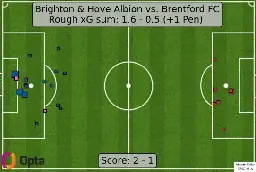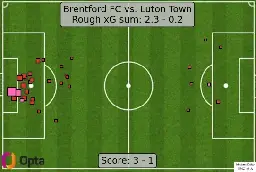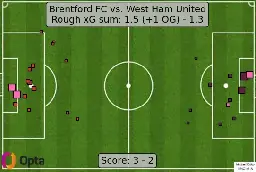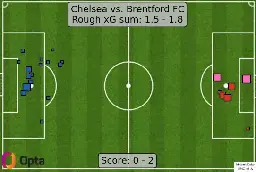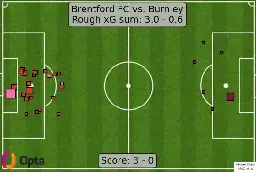Sure! Here's my crude, MS-Paint-esque diagram:

1-6 are pretty obvious, just marked with numbers. 7 and 8 are circled with a line looping back to their number. 8 is just peeking around a corner, while 7 is only barely visible, with part of the top of his head peaking out from behind 5's neck.
I count eight Kims (two of them only partially visible) in that shot of the prison cell, and there's a fair bit of room around the corner for more to be hidden. I think it's also easy to believe there are more cells containing more Kims just down the hall.
It's reasonable to assume that the Defiant class's 50 crew compliment is pretty close to a bare minimum already. 16-17 active at any one time is a pretty short list as it is, with roughly half that posted to the bridge during normal operations and most of the rest in engineering, plus a transporter chief, doctor, and other specialists. Having two shifts of reserves is crucial for covering both a long term assignment and for battle situations: you need to keep the crew as fresh as possible in the long run, and in combat you need those people to fill in for casualties and act as damage control, security, and emergency medical personnel. So unless Section 31's strategic level idiocy extends all the way down to inane meddling in shipboard operations (possible, these guys are morons with dangerously inflated egos!), it should be safe to assume that the Anaximander was supposed to be staffed with about 50 crew.
That sidesteps the question of why all of these comically evil people are okay with using this arbitrary contest to determine succession, instead of the usual route of organically murdering each other until someone emerges who is good enough at disposing of potential assassins that they keep the throne for a while?
I didn't watch the movie, so I'm probably missing something. Did Georgiou also have to deal with a bunch of normal assassination plots after officially gaining the throne? Or are we to assume that by virtue of winning this contest, she is widely seen as too dangerous for anyone to attempt to usurp?
Who’s gonna do it? You? You, Lieutenant Barclay?
Yes?
Lieutenant Barklay and the huge, powerful, and successful paramilitary organization who employs him are exactly who is supposed to guard Federation worlds. Which is what they do.
Episode Analysis | Star Trek: Lower Decks | 5x10 "The New Next Generation"
This is the Daystrom Institute Episode Analysis thread for Lower Decks 5x10 The New Next Generation.
Now that we’ve had a few days to digest the content of the latest episode, this thread is a place to dig a little deeper.
That makes quite a bit more sense, and if that was the intention I wish they'd been a little more explicit about it. I didn't even realize the implant was mucking with his emotional processing? Despite the Episode 1 throwaway line about it being a "Vulcan" implant, he seemed to have pretty normal emotional responses to me.
The showrunners said from a very early point that the two would not get together during the shows run, and I get the distinct impression that they actively enjoy trolling shippers. So this is pretty much exactly what I expected, and I'm perfectly happy with it.
(Also, look at Tendi in that last scene, when she gets a scan of Rutherford during a conversation about them being "just friends". She saw something on that Tricorder which she didn't expect, and then when Rutherford gets up and has his back turned, she's clearly checking him out. Draw your own conclusions.)
The overall Rutherford arc was less successful. I guess they seeded it previously, but I always just assumed his implant was on the fritz, so it was odd to see him suddenly blaming the ship.
I am at a loss as to how Rutherford's implant could be flexible enough to function as part of his brain in day-to-day life, and yet somehow be incapable of helping him solve engineering problems on an old ship? Is there some kind of weird DRM installed that prevents it from opening schematics older than a couple years? Or is all the data on California class systems stored in a file format that they latest and greatest starfleet tech can't open? Both of which would be rather colossal failures of Federation computer tech.
This was a pretty solid episode with some very good jokes (the thing about creating a warp field with one nacelle was fantastic, for example), but I left feeling underwhelmed because of the bizare "the first officer is two LTJGs" thing. Lower Decks has had a shockingly strong track record of not doing things that strike me as immediately stupid, but this is really silly. "Ransom must be pulling another twisted prank, because he's not this bad at his job" level silly. I think it's still better than promoting Tilly to XO, but that's a bar I had hoped this show would remain well clear of and a close shave is disappointing.
I think I understand why they did this: there's no obvious non-specialist XO candidate of an appropriate rank in the main cast (arguably Shax, but he's "only" a LT and does not seem ready for the job), and they didn't want to just trot out a handwave and say they'll be picking up the XO at the next starbase or something. I'd also theorize that they had planned to have two more seasons in which to work Mariner and Boimler into positions where they might actually make sense for an XO billet. But they aren't there yet, and they both know it.
Also, gosh would that alternate universe explorer thing have been useful in DISCO S3. And probably Prodigy too. It's also a dangerous can of worms to open for future stories, because having reliable access to random slightly different universes, apparently at different points in their timelines, is incredibly useful for both anticipating and solving problems in the "prime" universe. There's also cool stuff they can do with it and I'm sure they will, so I'm trying to keep an open mind.
Finally, props to them for coming up with a more plausible reason for our heroes to literally save the universe: because someone connected to them got unwittingly thrown into a position of enormous influence, and deliberately picked them. It's Zeus and company antagonizing Hercules, not Michael Burnham being central to solving five (?) entirely unrelated but galactically significant disasters, apparently by pure chance.
Episode Analysis | Star Trek: Lower Decks | 5x09 "Fissure Quest"
This is the Daystrom Institute Episode Analysis thread for Lower Decks 5x09 Fissure Quest.
Now that we’ve had a few days to digest the content of the latest episode, this thread is a place to dig a little deeper.
If Kolinahr works like it says on the tin (purging all emotion), it seems doubtful that the season would have the same plot. Spock probably wouldn't have been in whatever weird mood compelled him to "steal" the Enterprise and charge off to Cajitar. It's unclear how he would have been affected if he were again abruptly turned fully human, or if Chapel could have convinced the aliens to change him back, it seems especially unlikely that the two of them would have wound up in a relationship at all. So the emotional cause for his Subspace Rhapsody solo is gone.
As for the more technical side:
Uhura: I have a theory. I think since we're in a musical reality, we're actually following the rules of musicals. So, when do characters in musicals usually begin to sing? When their emotions are so heightened that words won't suffice. This musical reality wants us to sing about what's most pressing on our minds. These emotions have the power to overwhelm our capacity for rational thinking. They also have the potential to drive us apart.
If Uhura's theorizing was correct, an emotionless Spock would have probably been involved in the ensemble songs the same as always, but would by definition be incapable of experiencing "emotions [...] so heightened that words won't suffice". So it is unlikely that he would have found himself belting out a solo about anything.
I wonder how common is it for a starship to make their "Senior Science Officer" a two person team.
Clearly many captains don't see filling the role as a priority: None of the Enterprise D, Voyager, or (until this episode) the Cerritos had a senior science officer posted to the bridge. This makes a fair bit of sense on the grounds that "science" is an extraordinarily broad field and most of the practical, problem-solving sciencing we see tends to fall under the umbrella of engineering, so subject specialists and engineers wind up carrying the load as appropriate. As they should! No science officer can possibly hope to be comparably well versed in any given subject than a more junior officer who happens to specialize in it.
Therefore, although scientific acumen is obviously useful, as is getting as much scientific acumen as possible onto the bridge to quickly react to whatever weird shit a ship encounters, the larger part of the job is going to come down to synthesizing the larger knowledge base of the ship's contingent of scientists into an actionable answer. The Senior Science Officer should be asking themselves not just "what do I know about this", but "who else on the ship knows more about this" and, in a pinch, "which of these different ideas are we actually going to try."
Having two people in the role is beneficial for getting more scientific knowledge on the spot and ready to be used, especially if the two people involved work well together, but it's a potential liability in that final point where two people can reasonably disagree, but someone is going to have to make a call on what the best option is. In many cases that person is the captain, but when time is scarce and the choice is between things the captain doesn't understand, the choice is really going to come down to the science officer. And what happens when the two science officers disagree?
In this case, I think the correct choice between our two science heroes would be Tendi. She's (generally) good with other people, she has actual command experience (in combat situations, no less), she knows the bridge officers better, and they are more familiar with her. Further, T'Lyn is nominally a temporary posting who doesn't seem to view herself as a serious candidate for the role. All the conventional decision-aiding factors seem to favor Tendi, and we all know she's qualified.
Which leaves me wondering why this was a particularly difficult decision for Freeman, and why Data recommended this seemingly unconventional solution. Heck, Data barely even saw these two officers working together, as the two of them spent nearly the entire time working independently.
So maybe having multiple "senior" science officers is a normal state of affairs, and the expectation is that the captain will ultimately be able to resolve any final-stage disputes without needing an explicit head of the science division? That's plausible if potential awkward, and there do seem to be plenty of consoles at the back of the bridge for multiple science specialists to be sitting in.
Episode Analysis | Star Trek: Lower Decks | 5x07 "Fully Dilated"
This is the Daystrom Institute Episode Analysis thread for Lower Decks 5x07 Fully Dilated.
Now that we’ve had a few days to digest the content of the latest episode, this thread is a place to dig a little deeper.
I would have struggled to date the station given just the exterior, personally. A 2260s (or earlier) origin seems well within the bounds of possibility.
How many Starbases does Starfleet have? It seems that their numbering system is not truly sequential, as SB343 was existant in 2256, while SB173 was brand new in 2365. SB80 could be quite old, or relatively new but using a repurposed spaceframe from an older space station which had received a major upgrade.
Episode Analysis | Star Trek: Lower Decks | 5x05 "Starbase 80?!"
This is the Daystrom Institute Episode Analysis thread for Lower Decks 5x05 Starbase 80?!.
Now that we’ve had a few days to digest the content of the latest episode, this thread is a place to dig a little deeper.
I really liked this one. I think it did a good job making Starbase 80 fit into the universe as more than just a joke (why does starfleet have a starbase that everyone knows just totally sucks? Well, because of a bunch of weird circumstances, and also it's more complicated than the reputation).
Interesting, although unsurprising, that Mariner apparently didn't hang around SB80 long enough to figure out that there was more there than met the eye. A lot of the stuff uncovered in this episode should have been noticeable to a new transfer.
Who actually was Bargh? He's the "leader of the Klingon Oversight Council," who are supposedly tasked with approving the eligibility of officers. That doesn't sound like a body which would actually command ships or fleets directly, but Ma'ah describes his ship as being part of Bargh's fleet. Bargh's death is also not presented as something that would significantly shake the Klingon government. Kor had been on this council (and rejected Martok) in 2345, but Kor would have been approaching 100 at that point and likely wasn't especially active in day-to-day military command.
So is Bargh essentially a minor administrator on a power trip, or a person of significant status and power who commands fleets but also has a role on this relatively minor council? My inclination is the former, and Ma'ah is expressing some sour grapes in referring to "his" fleet, but it's not clear.
How did you do this?
Episode Analysis | Star Trek: Lower Decks | 5x04 "A Farewell to Farms"
This is the Daystrom Institute Episode Analysis thread for Lower Decks 5x04 A Farewell to Farms.
Now that we’ve had a few days to digest the content of the latest episode, this thread is a place to dig a little deeper.
Transporter clones appear to be vanishingly rare. We're aware of two (Thomas Riker and William Boimler), and the circumstances around Thomas Riker's existence were clearly unheard of to any of the people investigating. Clearly this is not a thing that transporters normally do, or are even capable of outside of extremely unusual circumstances.
It also seems pretty dystopian to require the insertion of artificial genetic markers to make a person more easily recognizable. Would we expect "normal" identical twins to be treated similarly? Or actual clones?
I think the larger lesson on this incident from Starfleet's perspective is that they need to beef up their internal security practices. Big shocker, that. Thomas Riker is neither the first nor last person to successfully impersonate a starfleet officer and cause major troubles in doing so, and most threat vectors can't be solved by preemptively identifying likely perpetrators (such as this likely very offended transporter clone) and modifying them specifically to make infiltration more difficult.
Episode Analysis | Star Trek: Lower Decks | 5x03 "The Best Exotic Nanite Hotel"
This is the Daystrom Institute Episode Analysis thread for Lower Decks 5x03 The Best Exotic Nanite Hotel.
Now that we’ve had a few days to digest the content of the latest episode, this thread is a place to dig a little deeper.
Starfleet seems to have an interesting relationship with the media, giving privileged access to reporters who are willing to make at least some of their subjects look bad. Low-ranking officers also evidently know a whole lot about weird and embarrassing things that other crews have done, so at least basically mission logs must be relatively easy to access.
There are counterexamples, but on the whole, it doesn't seem like the kind of information that would matter to that magazine is controlled much at all.
Episode Analysis | Star Trek: Lower Decks | 5x01 "Dos Cerritos" and 5x02 “Shades of Green”
This is the Daystrom Institute Episode Analysis thread for Lower Decks 5x01 Dos Cerritos and 5x02 Shades of Green.
Now that we’ve had a few days to digest the content of the latest episode, this thread is a place to dig a little deeper.
"Author, Author" highlights the societal dangers of automatons which convincingly simulate consciousness
It's easy for us to understand that The Doctor is a sapient being.
After all, he acts like one! He's got a slew of odd personality quirks, balances irritating behavior with kindness and sympathy, behaves in a similarly slightly erratic manner as most of us flesh and blood creatures, and responds to difficulties with every appearance of genuine emotion. It's extremely easy for human audiences to look at the early seasons Voyager crew as bigoted for their slow acceptance of him as a "real" member of the crew, and react very harshly to later challenges to his personhood from people outside of the crew. It's not uncommon to see that behavior referenced as proof that 24th century people are no more "enlightened" than the obviously flawed people of today. And maybe they aren't; that's not my topic for today.
But the element I think that argument is missing is something these 24th century people have been exposed to all their lives, and we in 2024 have only begun to encounter: soulless, unconscious entities capable of impressive imitations of a real person.
24th century holograms appear as perfect copies of physical humans, with perfectly recognizable voices, normal human mannerisms, and convincingly human speech that responds naturally and automatically to nearly any expected or unexpected input. Any of us unknowingly tossed onto a 24th century holodeck would be totally convinced that these people projected around us and interacting with us are as real as anybody we meet today: nothing they do will clue us in to the fact that we're interacting with philosophical zombies.
Most of us first encountered something like this when ChatGPT and it's ilk suddenly got really good and easily accessible just a couple years ago. Suddenly a computer could create text that read like a human had written it, responding to context and occasionally interjecting very human behaviors (like making up answers to stuff it didn't know, and attempting to gaslight anyone who called it out for being wrong). A shocking number of modern people seem to genuinely believe that these bots show real consciousness (even some who really ought to know better). And it's not hard to understand why, when these bots can spoof every text-based indication of humanity that most of us look for.
People of the 24th century have spent their entire lives interacting with bots that smash the Turing Test even more thoroughly, and on every level imaginable. They can walk onto a holodeck and spin up a person from scratch who looks, smells, feels, and sounds completely real, who talks coherently and shows perfectly ordinary physical mannerisms. And they also know, with ironclad certainty, that these creations are no more human and no more alive than a tricorder or a hyperspanner. Just about all they have to definitively prove if someone is real or not lies in if they can exist outside the holodeck.
Enter The Doctor. He's very definitively a hologram. When first activated he's no more real than any other holographic creation, and only slowly grows in unanticipated ways which slowly convince his crew that he's become something more than that. This process is slow, but it's actually a bit of a surprise that it happens at all. Excepting Kes and Neelix, everyone on Voyager is quite accustomed to holographically generated people who act human but are purely a facade. That this very reasonable prejudice could be overcome at all should be seen as a triumph of empathy. It's not at all surprising that the people back home on Earth aren't buying it, and can't even be persuaded beyond a bare minimum threshold of plausible uncertainty.
I theorize that people who are growing up right now in an environment of very convincing AI chatbots will find it easier than we did to recognize holographic beings in Star Trek shows as sophisticated extensions of those internet bots, and will mirror the slow acceptance by Voyager's crew that The Doctor is something more than that.
So what does that mean for us? What do we do as more of our instinctive indicators of another person's humanity are effortlessly aped by machines? This is a difficulty which Star Trek shows had only begun to grapple with, but it's fertile ground for future episodes and undeniably a relevant question for our day.
Apparently your tap water is dramatically colder than any house or apartment I've lived in.
Yes, putting ice in water does make me enjoy it more, and no, letting the tap run doesn't do nearly as much to cool it down as ice cubes do.
It's really depressing how any internet discussion about global warming is full of comments like this which only exist to downplay small but existent improvements that others have made. It's whataboutism, plain and simple, and only serves to discourage people from doing anything at all.
This guy getting a more efficient stove isn't going to save the planet, but at least it helps. Your comment (and many others in this thread) doesn't do anything at all about our climate problem, and mostly serves to make other people feel stupid and inadequate for even trying to do something.
There is so much, so fucking much, that needs to be done to save our planet. If you think that political change is the only thing that will "really" matter to save the planet (it's obviously going to be a huge factor), and you are so deeply committed to the ideal that the only things worth doing are those which directly further said political change, then you have serious work to do on your messaging strategy because what you had to say here clearly isn't causing global change.
Alternately, if you think the situation is so impossible that nothing can be done to save it, go find a different void to yell into and stop trying to drag down those of us who still have some hope.
Voyager's original CMO was a Lieutenant Commander, which is presumably pretty typical for a ship of Voyager's size. Bashir was commissioned as a Lieutenant Junior Grade to be the CMO on a backwater space station, so that's presumably the bare minimum.
I would expect the Doctor's first official rank (whatever that might be) to stick with him, plus promotion as appropriate. Adjusting it up and down based on posting would be a bizare thing to do for any other crewperson, and I'm sure The Doctor would object vigorously to such a thing.
Why was the genetic engineering research at Darwin Station in TNG 2x07 "Unnatural Selection" legal?
Darwin Station was an explicitly Federation genetic research facility which was creating human children with telepathic and telekinetic powers, rapid physical maturation, and immensely powerful active immune systems (the last of which unwittingly killed the crew of a transport ship). This seems like precisely the sort of genetic engineering which has been banned in the Federation since it's conception, in regulations which are repeatedly referenced in TNG, DS9, and VOY. And yet, nobody even hints at there being an ethical, legal, or regulatory issue with what these researchers are doing. Dr. Pulaski even says of one augment child, without any apparent concern, "We could be looking at the future of humanity."
One would think that if one has a broad reaching policy against genetic augmentation principally motivated by the genetic wars, and by subsequent reinforcement of the idea that arbitrarily enhanced people are likely to be dangerously unstable, this sort of genetic program is exactly what that policy exists to prevent. And yet, there is it.
So, what happened here? Was this the product of a brief lull in Federation policy regarding genetic augmentation? A Federation research team going way off the rails, meeting an Enterprise crew feeling unusually liassez-faire about Federation law? Or something else?
xG Map for Brighton vs Brentford
Brentford's defense held up alright, but they really struggled to move the ball through midfield or spring any really dangerous looking counters against a team that has had shown some real defensive frailty this season. Of course it's hardly a shock that a squad missing Norgaard and Jensen was lacking in midfield technical ability, or that Saman Ghoddos might be imperfect defensively while moonlighting at left back.
All things considered, this could have gone much worse.
xG Map for Brentford vs Luton
Domination.
Brentford head coach Thomas Frank reveals that full-back Aaron Hickey will be out until 2024 with a hamstring injury; the Bees boss also praised his players' mentality after a comeback which saw the west Londoners beat West Ham United 3-2 in the Premier League on Saturday

The injuries just keep on coming, don't they?
Hickey is out with a hamstring injury until 2024, leaving the team with midfielder Vitaly Janelt as seemingly the only remaining option on the roster to play left back. I imagine his primary backup would be Ghoddos, or possibly Ben Mee? Mbeumo has been frequently deployed in that spot when chasing games, but surely he won't be used there under normal circumstances.
Hopefully Flekken's "dead leg" is a strictly temporary issue and he'll be back out there against Liverpool on Sunday. He hasn't exactly impressed this season, but Strakosha's only start of the season was disastrous and he was barely challenged in goal on Saturday (although his distribution was pretty good).
Episode Analysis | Star Trek: Lower Decks | 4x10 "Old Friends, New Planets"
This is the Daystrom Institute Episode Analysis thread for Lower Decks 4x10 Old Friends, New Planets.
Now that we’ve had a few days to digest the content of the latest episode, this thread is a place to dig a little deeper.
xG Map for Chelsea vs Brentford
Lucky to be a full 2-0 for sure, but Brentford were the better side.
Brentford's former striker Marcus Gayle goes to schools to teach kids about discrimination - The Athletic joined him
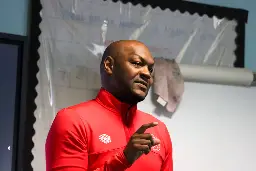
It's great to see the club doing stuff like this.
xG Map for Brentford vs Burnley
A proper thrashing, and this time with points to match.
/r/AskReddit Comments Per Day, Graphed


Just in case anyone here was wondering how Reddit's numbers are looking these days...
Data and visuals from https://subredditstats.com/r/askreddit
Episode Analysis | Star Trek: Lower Decks | 4x07 "A Few Badgeys More"
This is the Daystrom Institute Episode Analysis thread for Lower Decks 4x07 A Few Badgeys More.
Now that we’ve had a few days to digest the content of the latest episode, this thread is a place to dig a little deeper.
Episode Analysis | Star Trek: Lower Decks | 4x06 "Parth Ferengi's Heart Place"
This is the Daystrom Institute Episode Analysis thread for Lower Decks 4x06 Parth Ferengi's Heart Place.
Now that we’ve had a few days to digest the content of the latest episode, this thread is a place to dig a little deeper.

